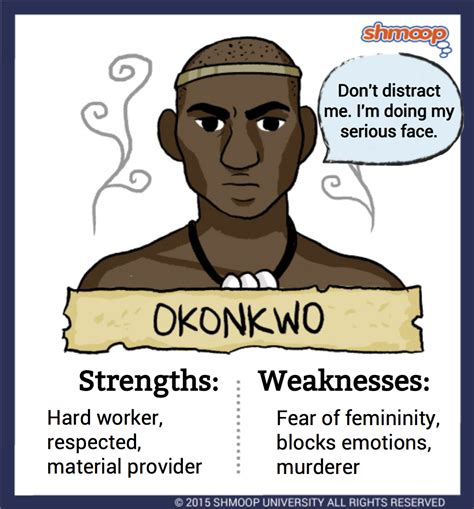Okonkwo Things Fall Apart

Chinua Achebe's seminal novel, "Things Fall Apart," is a masterful exploration of the complexities of Igbo culture, the devastating effects of colonialism, and the tragic flaws of its protagonist, Okonkwo. Published in 1958, the book has become a cornerstone of modern African literature, offering a nuanced and multifaceted portrayal of life in a Nigerian village on the cusp of colonial invasion. Through Okonkwo's story, Achebe delves into the intricacies of traditional Igbo society, revealing a rich tapestry of customs, values, and beliefs that are both familiar and foreign to Western readers.
The Historical Context of Okonkwo’s World

The late 19th century, the time period in which “Things Fall Apart” is set, was a tumultuous era for the Igbo people. The British were expanding their colonial empire, and Nigeria was a prime target for annexation. Achebe’s novel is set in the fictional village of Umuofia, which is loosely based on his own hometown of Ogidi. The Igbo people were a decentralized, democratic society, with a strong emphasis on community, family, and individual achievement. Okonkwo, the protagonist, is a product of this society, and his struggles and triumphs are deeply rooted in the cultural and historical context of his time.
The Character of Okonkwo: A Complex Portrait
Okonkwo is a complex, multifaceted character, driven by a deep-seated desire to prove himself as a man. His father, Unoka, was a lazy, debt-ridden musician, and Okonkwo is determined to avoid his father’s mistakes. He is a successful farmer, a skilled wrestler, and a respected member of his community. However, Okonkwo’s obsession with masculinity and his fear of being seen as weak or effeminate lead him down a path of destruction. Through Okonkwo’s character, Achebe explores the tensions between traditional Igbo values and the changing social and economic landscape of colonial Nigeria.
| Key Events in Okonkwo's Life | Consequences |
|---|---|
| Becomes a successful farmer and wrestler | Gains respect and admiration from his community |
| Kills a clansman, Ikemefuna, as a test of his courage | Experiences guilt and emotional turmoil |
| Is exiled from his village for seven years | Undergoes a period of personal growth and reflection |
| Returns to his village to find it changed by colonialism | Feels disillusioned and disconnected from his community |

The Impact of Colonialism on Igbo Society

The arrival of British colonizers in Nigeria had a profound impact on Igbo society. The imposition of Western values, customs, and institutions disrupted the traditional way of life, leading to a decline in the social and economic status of the Igbo people. Achebe’s novel captures the sense of dislocation and disorientation that resulted from this cultural upheaval. Okonkwo’s struggles to adapt to the changing social landscape serve as a powerful metaphor for the broader impact of colonialism on Igbo society.
The Role of Women in Igbo Society
Women play a significant role in Igbo society, and Achebe’s novel offers a nuanced portrayal of their experiences. Okonkwo’s wives, Ekwefi and Ojiugo, are strong, independent women who embody the values of Igbo culture. However, they are also subject to the patriarchal norms of their society, and their lives are shaped by the expectations placed upon them. Through the characters of Ekwefi and Ojiugo, Achebe highlights the importance of women’s roles in maintaining social cohesion and promoting cultural continuity.
Key Points
- Okonkwo's character serves as a powerful commentary on the dangers of toxic masculinity and the importance of emotional intelligence.
- The impact of colonialism on Igbo society was profound, leading to a decline in the social and economic status of the Igbo people.
- Women play a significant role in Igbo society, and their experiences are shaped by the patriarchal norms of their culture.
- Achebe's novel offers a nuanced portrayal of Igbo culture, highlighting the complexities and contradictions of traditional society.
- The novel serves as a powerful critique of colonialism, highlighting the destructive impact of Western values and institutions on non-Western cultures.
Conclusion: The Enduring Legacy of “Things Fall Apart”
Achebe’s “Things Fall Apart” is a masterpiece of modern African literature, offering a powerful and enduring portrait of Igbo culture and the devastating impact of colonialism. Through Okonkwo’s story, Achebe explores the complexities of traditional society, the tensions between cultural continuity and change, and the human cost of colonialism. The novel’s themes and characters continue to resonate with readers today, offering a powerful commentary on the importance of cultural understanding, empathy, and respect.
What is the historical context of “Things Fall Apart”?
+The novel is set in the late 19th century, a time of significant change and upheaval in Nigeria. The British were expanding their colonial empire, and the Igbo people were facing the threat of colonization.
What is the significance of Okonkwo’s character in the novel?
+Okonkwo’s character serves as a powerful commentary on the dangers of toxic masculinity and the importance of emotional intelligence. His struggles and triumphs offer a nuanced portrayal of the complexities of traditional Igbo society.
How does the novel portray the impact of colonialism on Igbo society?
+The novel captures the sense of dislocation and disorientation that resulted from the imposition of Western values, customs, and institutions on Igbo society. The decline in the social and economic status of the Igbo people is a powerful commentary on the destructive impact of colonialism.
